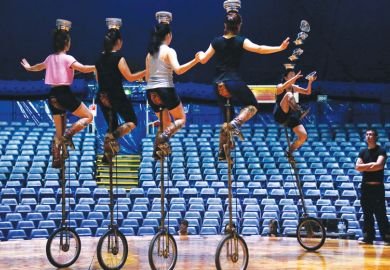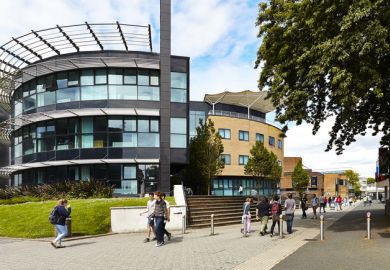Australian universities confronting uncertain international student flows could face a double whammy from a softening of domestic demand, as the buoyant labour market lures locals from courses into jobs.
Early figures point to a decline in new domestic enrolments at undergraduate or postgraduate level, and sometimes both, as Australia’s unemployment rate lingers at a 13-year low.
Most universities either did not respond to Times Higher Education’s request for their latest enrolment statistics or declined to provide them, citing the commercial sensitivity or volatility of the data. But of those prepared to share their figures, many reported declines in domestic commencements compared with 2021 – although student numbers continued to hover above 2020 levels.
Queensland’s University of the Sunshine Coast said that a spike in domestic study last year had “returned to a normal growth pattern”, with local enrolments 4 per cent lower than at the start of 2021. But overall figures remained 6 per cent higher than in 2020, a spokesman said.
The University of Canberra said its domestic undergraduate commencements were about 5 per cent above 2020 levels but 3 per cent below 2021. “We know that when employment opportunities increase, enrolments tend to decrease,” said deputy vice-chancellor Geoff Crisp. He said that domestic postgraduate commencements had risen by more than a quarter “in line with a range of new courses”.
The University of Western Australia said it expected the labour market shortages to affect domestic postgraduate enrolments “but we don’t know yet how much of an impact”. And while domestic undergraduate enrolments over the past two years had been “inflated” by expatriates coming home and school-leavers deferring gap year breaks, it said that this year’s figures were still “strongly above” 2020 numbers. “There is underlying growth in the school-leaver population,” the university insisted.
However, an analysis of Australian Bureau of Statistics data by policy expert Andrew Norton suggests school-leaver numbers are patchy. Year 12 school enrolments grew last year in Queensland, South Australia, Western Australia, Victoria and the Australian Capital Territory but declined in New South Wales, the Northern Territory and Tasmania.
In any case, Professor Norton said that the strong labour market would be more likely to affect enrolments among older students than those fresh out of school. He said soaring joblessness in the early stages of the pandemic had coincided with a “big spike” in mature-aged enrolments, but it was likely to prove short-lived. “Those labour market difficulties are over for most people. You would expect mature-aged demand to trend down.”
Professor Norton, professor in the practice of higher education policy at the Australian National University, said universities could miss out on some of their federal government funding if their domestic student numbers plunged significantly. But most were still carrying “fat” from over-enrolments in 2020, and were likely to achieve this year’s targets.
The University of South Australia said that domestic enrolment numbers, particularly among mature age students, were “slightly lower than the highs of last year”. The University of Queensland said that it had made almost 2 per cent more offers to undergraduate students this year than last. The University of Sydney expected a slight increase in domestic undergraduate numbers and a decline among postgraduates.
Charles Sturt, Central Queensland and Curtin universities bucked the trend, reporting strong domestic growth at both undergraduate and postgraduate levels. Nevertheless, Curtin’s domestic commencements remained 4 per cent below the levels of 2020, which was a record year for new Australian enrolments at the Perth institution.
Register to continue
Why register?
- Registration is free and only takes a moment
- Once registered, you can read 3 articles a month
- Sign up for our newsletter
Subscribe
Or subscribe for unlimited access to:
- Unlimited access to news, views, insights & reviews
- Digital editions
- Digital access to THE’s university and college rankings analysis
Already registered or a current subscriber?









